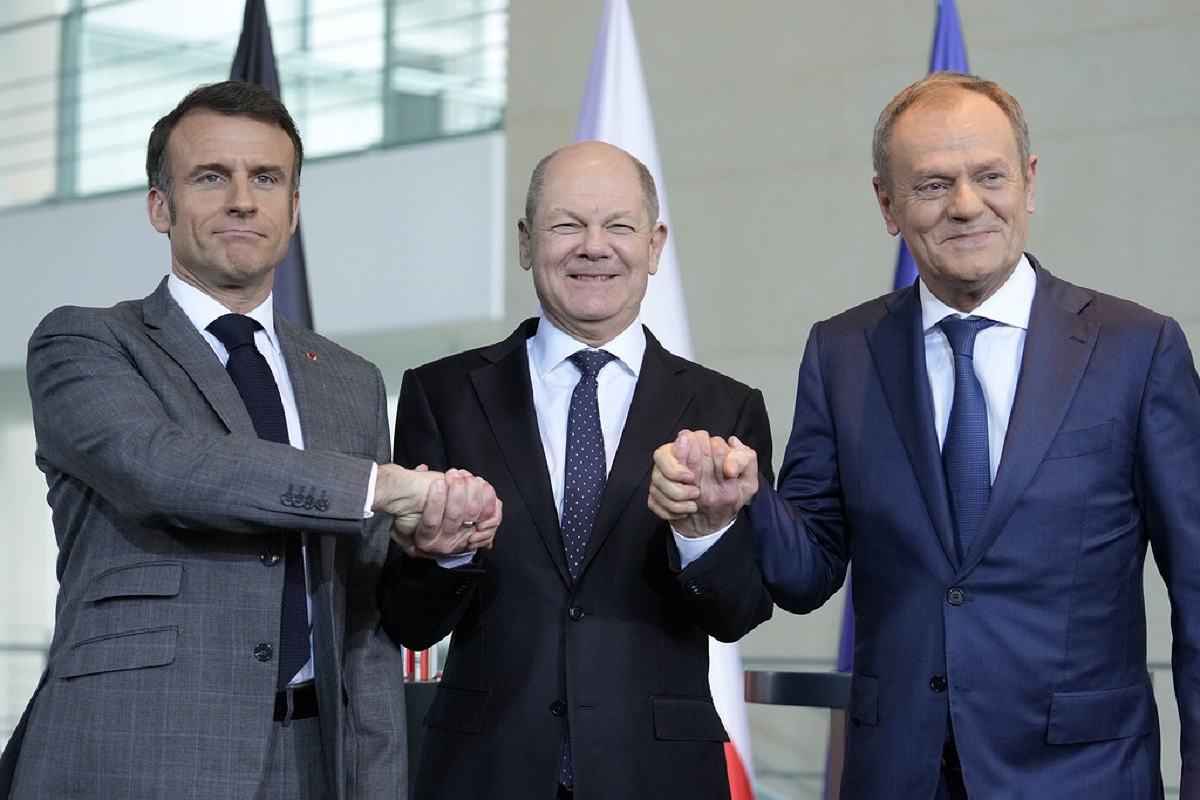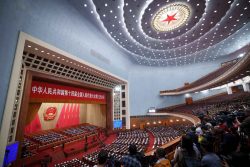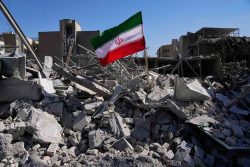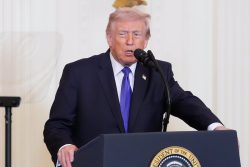
German Chancellor Olaf Scholz, center, French President Emmanuel Macron, left, and Poland’s Prime Minister Donald Tusk shake hands at a press conference in Berlin, Germany, Friday, March 15, 2024.
15:15 JST, March 16, 2024
BERLIN (AP) — Germany, France and Poland vowed Friday to procure more weapons for Kyiv and step up production of military equipment along with partners in Ukraine, promising that Ukraine can rely on the trio of European powers as it tries to overcome a shortage of military resources.
German Chancellor Olaf Scholz welcomed French President Emmanuel Macron and Polish Prime Minister Donald Tusk for a hastily arranged summit of the so-called “Weimar Triangle” of the three countries. The meeting came as Russia votes in an election that is all but certain to extend President Vladimir Putin’s rule.
Scholz said he discussed what support is needed now with Ukrainian President Volodymyr Zelenskyy on Thursday.
“He knows that he can rely on us, and we are renewing this signal for support for Kyiv from here today,” he said after the meeting. “But a crystal-clear signal also goes to Moscow — the Russian president should know that we won’t let up in our support for Ukraine.”
Kyiv’s forces are hoping for more military supplies from Ukraine’s Western partners, but in the meantime, they are struggling against a bigger and better-provisioned Russian army that is pressing hard at some front-line points in Ukraine. The European Union’s plans to produce 1 million artillery rounds for Ukraine have fallen well short, while aid for Ukraine is being held up in the United States by political differences.
The German leader said that “starting immediately, we will procure even more weapons for Ukraine, on the overall world market.”
“Secondly, the production of military equipment will be expanded, including though cooperation with partners in Ukraine,” Scholz added. And he said that a new “coalition for long-range rocket artillery” will be set up, underlining a pledge made at a conference in Paris last month.
Scholz gave no details, and the three leaders took no questions. Macron reaffirmed France’s support for a Czech-initiated plan to buy ammunition and shells outside the European Union, but also gave no details.
“We want to spend our money, we want to help in every possible way … here and now, so that the situation of Ukraine in the coming weeks and months gets better, not worse,” Tusk said.
Kyiv’s forces are hoping for more military supplies from Ukraine’s Western partners, but in the meantime, they are struggling against a bigger and better-provisioned Russian army that is pressing hard at some front-line points in Ukraine. The European Union’s plans to produce 1 million artillery rounds for Ukraine have fallen well short, while aid for Ukraine is being held up in the United States by political differences.
“This is a serious moment,” Macron said. “A new era is dawning, and we’ll be there. And the fact that the three of us are united on this day, determined with the same lucidity about the situation in Ukraine and determined never to let Russia win and to support the Ukrainian people to the end, is a strength for us, our peoples, our security and our Europe.”
Germany, France and Poland are among Ukraine’s key allies. Germany has become Ukraine’s second-biggest supplier of military aid after the United States and is stepping up support this year, although Scholz has faced criticism for refusing to send Taurus long-range cruise missiles.
The leaders’ remarks didn’t address differences between Scholz and Macron after the French leader said at last month’s conference that sending in Western ground troops should not be ruled out in the future. Scholz said then that participants had agreed there will be “no ground troops” on Ukrainian soil sent by European countries.
On Thursday, Macron reiterated his position, though he said the current situation doesn’t require sending ground troops. Scholz’s spokesperson, Steffen Hebestreit, made clear Friday that the chancellor hasn’t changed his views.
In Brussels, the EU’s executive branch on Friday allocated 500 million euros ($545 million) to a project to reduce bottlenecks slowing the production of explosives and other materials used to manufacture artillery shells for the bloc and its allies. The European Commission estimates that the plan will allow industry to produce 1.7 million shells annually by the end of the year, and 2 million by late 2025.
Scholz and Tusk have both visited Washington recently and pressed for the U.S. to release aid for Ukraine.
Top Articles in News Services
-

Survey Shows False Election Info Perceived as True
-

Hong Kong Ex-Publisher Jimmy Lai’s Sentence Raises International Outcry as China Defends It
-

Japan’s Nikkei Stock Average Falls as US-Iran Tensions Unsettle Investors (UPDATE 1)
-

Japan’s Nikkei Stock Average Touches 58,000 as Yen, Jgbs Rally on Election Fallout (UPDATE 1)
-

Japan’s Nikkei Stock Average Rises on Tech Rally and Takaichi’s Spending Hopes (UPDATE 1)
JN ACCESS RANKING
-

Producer Behind Pop Group XG Arrested for Cocaine Possession
-

Japan PM Takaichi’s Cabinet Resigns en Masse
-

Man Infected with Measles Reportedly Dined at Restaurant in Tokyo Station
-

Israeli Ambassador to Japan Speaks about Japan’s Role in the Reconstruction of Gaza
-

Videos Plagiarized, Reposted with False Subtitles Claiming ‘Ryukyu Belongs to China’; Anti-China False Information Also Posted in Japan



























